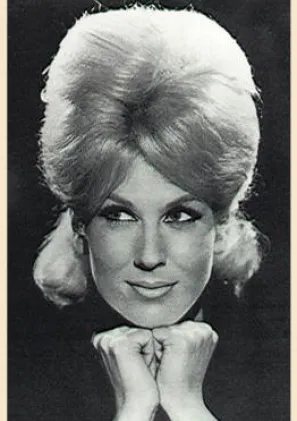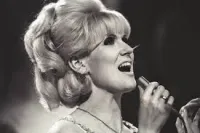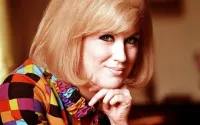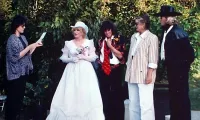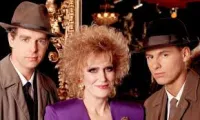Biography
1939 - 1999
"My sexuality has never been a problem to me but I think it has been for other people."
- Dusty Springfield
Husky-voiced Dusty Springfield was known as ‘The White Queen of Soul.’ Born Mary O’Brien, her first taste of success came in the folk group The Springfields. While touring the U.S., she discovered the Motown sound. Inspired, she left the Springfields and transformed herself with a “far out” wardrobe, towering blonde beehive, and black mascara'd eyes. Springfield’s first solo hit ‘I Only Want to Be With You’ was released in 1964 – the same year she was deported from South Africa for refusing to sing before a segregated audience. In 1965 she used the occasion of hosting the ‘Ready, Steady, Go!’ variety show to introduce the Motown sound (Stevie Wonder, The Miracles, Martha & The Vandellas) to much of Britain. Her hits throughout the 60s included ‘You Don’t Have to Say You Love Me’, ‘Wishin and Hopin’, ‘I Just Don’t Know What To Do With Myself’, ‘The Look of Love’, and ‘Son of a Preacher Man’ from the classic ‘Dusty in Memphis’ LP. An insecure perfectionist, Springfield was highly critical of her own voice and music. In 1971 she came out publicly as a bisexual, though by most sources she was a lesbian. Following a dark period of addiction and her subsequent recovery, she returned in 1986 by teaming with the Pet Shop Boys for the hit ‘What Have I Done to Deserve This?’ While recording her final album in 1995 she was diagnosed with breast cancer and battled the disease for 4 years. Dusty Springfield died in 1999 – just shy of her 60th birthday. Shortly thereafter, she was posthumously inducted into the Rock and Roll Hall of Fame, and was named an Officer of the Order of the British Empire.
1939 - 1999
"My sexuality has never been a problem to me but I think it has been for other people."
- Dusty Springfield
Husky-voiced Dusty Springfield was known as ‘The White Queen of Soul.’ Born Mary O’Brien, her first taste of success came in the folk group The Springfields. While touring the U.S., she discovered the Motown sound. Inspired, she left the Springfields and transformed herself with a “far out” wardrobe, towering blonde beehive, and black mascara'd eyes. Springfield’s first solo hit ‘I Only Want to Be With You’ was released in 1964 – the same year she was deported from South Africa for refusing to sing before a segregated audience. In 1965 she used the occasion of hosting the ‘Ready, Steady, Go!’ variety show to introduce the Motown sound (Stevie Wonder, The Miracles, Martha & The Vandellas) to much of Britain. Her hits throughout the 60s included ‘You Don’t Have to Say You Love Me’, ‘Wishin and Hopin’, ‘I Just Don’t Know What To Do With Myself’, ‘The Look of Love’, and ‘Son of a Preacher Man’ from the classic ‘Dusty in Memphis’ LP. An insecure perfectionist, Springfield was highly critical of her own voice and music. In 1971 she came out publicly as a bisexual, though by most sources she was a lesbian. Following a dark period of addiction and her subsequent recovery, she returned in 1986 by teaming with the Pet Shop Boys for the hit ‘What Have I Done to Deserve This?’ While recording her final album in 1995 she was diagnosed with breast cancer and battled the disease for 4 years. Dusty Springfield died in 1999 – just shy of her 60th birthday. Shortly thereafter, she was posthumously inducted into the Rock and Roll Hall of Fame, and was named an Officer of the Order of the British Empire.
Demography
Demography
Gender Female
Sexual Orientation Bisexual
Gender Identity Cisgender
Ethnicity Caucasian/White
Faith Construct Catholic
Nations Affiliated United Kingdom United States
Era/Epoch Information Age (1970-present) Post-Stonewall Era (1974-1980)
Field(s) of Contribution
Music
Television
Commemorations & Honors
US Rock and Roll Hall of Fame Inductee (1999)
Officer of the Order of the British Empire Recipient For Services to Popular Music (1999)
Posthumous Grammy Hall of Fame Inductee (2001)
Posthumous UK Music Hall of Fame Inductee (2006)
Demography
Gender Female
Sexual Orientation Bisexual
Gender Identity Cisgender
Ethnicity Caucasian/White
Faith Construct Catholic
Nations Affiliated United Kingdom United States
Era/Epoch Information Age (1970-present) Post-Stonewall Era (1974-1980)
Field(s) of Contribution
Music
Television
Commemorations & Honors
US Rock and Roll Hall of Fame Inductee (1999)
Officer of the Order of the British Empire Recipient For Services to Popular Music (1999)
Posthumous Grammy Hall of Fame Inductee (2001)
Posthumous UK Music Hall of Fame Inductee (2006)
Resources
Resources
O'Brien, Lucy. Dusty. Rev. ed. London: Sidgwick & Jackson, 2000.
Smith, Patricia Juliana. "'You Don't Have to Say You Love Me': The Camp Masquerades of Dusty Springfield." The Queer Sixties. Patricia Juliana Smith, ed. New York: Routledge, 1999. 105-126.
Resources
O'Brien, Lucy. Dusty. Rev. ed. London: Sidgwick & Jackson, 2000.
Smith, Patricia Juliana. "'You Don't Have to Say You Love Me': The Camp Masquerades of Dusty Springfield." The Queer Sixties. Patricia Juliana Smith, ed. New York: Routledge, 1999. 105-126.
